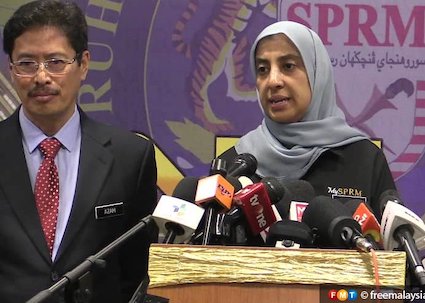An error of judgment?

Salleh Buang, NST
AS I was about to leave my office in Alor Star on Wednesday, I received a call from a journalist who wanted to know if a conversation between two individuals (A and B) on the phone could be recorded by one of them (B).
My response: yes, if A consents. Alternatively, if there is a court order allowing B to do so. That important rule is grounded on the law of privacy, which is a recognised human right.
In 2010, the Federal Court said in Sivarasa v Badan Peguam Malaysia & Anor that the right to personal liberty includes the “right to privacy”.
The journalist asked whether enforcement authorities (such as the Malaysian Anti-Corruption Commission and police) could listen in and record (wire-tap) private conversations of the public.
I said yes, if there is a court order or if there is a law allowing them to do so.
As a general rule, if evidence is gathered illegally or improperly by the authorities, they would ultimately face a problem when adducing such evidence in court later. The court may rule that the evidence so acquired is inadmissible. Even if the court admits it, there is always the question of how much weight can the court give to such evidence.
Having said that, Wednesday’s disclosure of the audio recordings by MACC surprised me and many of my colleagues. We are puzzled why MACC finds it necessary to make public the present status of its investigations into an ongoing court case. Is it not more prudent to keep secret what and who is currently the subject of its investigation? If MACC intended to build a new case, should it not be kept under wraps first, until all the evidence has been gathered?
Media reports yesterday quoted MACC Chief Commissioner Latheefa Koya that the contents of the recorded conversations were “shocking, sordid and very disturbing”.
When asked whether the disclosure would have any impact on the criminal proceedings against former prime minister Datuk Seri Najib Razak, she said that it was a matter of public interest and involved national security.
She said serious issues had risen from the alleged conversation, including “abuse of power, criminal conspiracy, obstruction of justice, compromising national security, fabrication of false evidence through foreign assistance and connivance”.
I beg to differ. As I see it, the audio recordings raised several questions, such as, who recorded them? Was it an individual acting on his own, or a government official acting under orders? If they were done by a government official, were they made after obtaining a court order, or were they authorised by the public prosecutor? Will these recordings be tendered in court as evidence?
It’s true that law enforcement officers in Malaysia are empowered under several provisions of the law to wiretap conversations of “suspects” pursuant to a criminal investigation. The provisions are provided for under Section 116C of the Criminal Procedure Code (CPC), Section 27A of the Dangerous Drugs Act 1952, section 11 of the Kidnapping Act 1961, Section 43 of the MACC Act 2009, and Section 6 of the Security Offences (Special Measures) Act 2012.
However, it should be mentioned that under section 116C of the CPC, the authority for the police to wiretap a conversation must first be given by the public prosecutor “if he considers it likely to contain any information relating to the commission of an offence”.
Such antecedent permission in the instant audio recording of the alleged conversations is highly unlikely, although I could be wrong.
The disclosure by MACC, I believe, is an error of judgment, especially at a time when the case is ongoing. It may even be subjudice. It would not be a surprise if the person allegedly involved in the conversation in the recording initiated subjudice and contempt proceedings against MACC.

